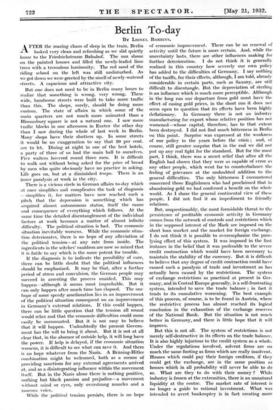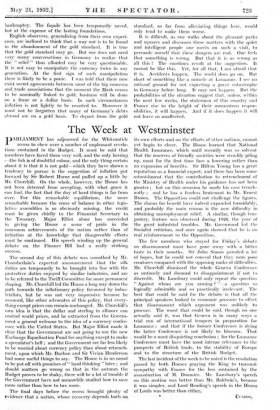Berlin To-day
BY LIONEL ROBBINS.
AFTER the roaring chaos of sleep in the train, Berlin looked very clean and refreshing as we slid quietly home to the Friedrichstrasse Bahnhof. The sun shone
on the painted houses and filled the newly-leafed lime trees with a tremulous luminosity. The red sand of the riding school on the left was still undisturbed. As we got down we were greeted by the smell of newly-watered streets. A capacious and attractive city.
But one does not need to be in Berlin many hours to realize that something is wrong, very wrong. These wide, handsome streets were built to take more traffic than this. The shops, surely, should be doing more custom. The state of affairs in which some of the main quarters are not much more animated than a Bloomsbury square is not a natural one. I saw more traffic blocks in one afternoon in Exeter the other day than I saw during the whole of last week in Berlin.
Many shops have their shutters up. In some streets it would be no exaggeration to say that 20 per cent.
arc to let. Dining at night in one of the best hotels, a party of three of us had the main hall to ourselves. FiVe waiters hovered round three men. It is difficult
to walk out without being asked for the price of bread by men who quite obviously have no practice in asking. Life goes on, but at a diminished tempo. There is an inner paralysis at work in the city.
There is a vicious circle in German affairs to-day which at once simplifies and complicates the task of diagnosis --simplifies it, for matters have now reached such a pitch that the depression is something which has acquired almost autonomous status, itself the cause and consequence of everything which follows. At the same time the detailed disentanglement of the individual factors at work becomes a matter of almost infinite difficulty. The political situation is bad. The economic situation inevitably worsens. While the economic situa- tion deteriorates, there is no hope of any alleviation of the political tension—at any rate from inside. The ingredients in the witches' cauldron are now so mixed that it is futile to say which is the more potent for trouble.
If the diagnosis is to indicate the possibility of cure, there can be little doubt that the political influences should be emphasized. It may be that, after a further period of stress and convulsion, the German people may succeed in arresting the process unaided. This may happen—although it seems most improbable. But it can only happen after much time has elapsed. The one hope of more speedy amelioration lies in an improvement of the political situation consequent on an improvement in Germany's external relations. If this could happen, there can be little question that the tension all round would relax and that the economic difficulties could more easily be surmounted. But it is not easy to believe that it will happen. Undoubtedly the present Govern- ment has the will to bring it about. But it is not at all clear that, in the absence of outside help, it will long have the power. If help is delayed, if the economic situation -worsens, it is difficult to see what can save it. And there is no hope whatever from the Nazis. A Briining-Hitler combination might be welcomed, both as a means of providing sanctions for any external agreements arrived at, and as a disintegrating influence within the movement itself. But in the Nazis alone there is nothing positive, nothing but black passion and prejudice—a movement without mind or eyes, only overstrung muscles and a raucous voice.
While the political tension persists, there is no hope of economic improvement. There can be no renewal of activity until the future is more certain. And, while the uncertainty lasts, there are other influences making for further deterioration. I do not think it is generally realized in this country how severely our own policy has added to the difficulties of Germany. I say nothing of the tariffs, for their effects, although, I am told, already considerable in certain parts, such as Saxony, are still difficult to disentangle. But the depreciation of sterling is an influence which is much more perceptible. Although in the long run our departure from gold must have the effect of easing gold prices, in the short run it does not: seem open to question that its effects have been highly deflationary. In Germany there is not an industry manufacturing for export whose relative position has not worsened—whose capital, therefore, has to that extent been destroyed. I did not find much bitterness in Berlin on this point. Surprise was expressed at the weakness of our policy in the years before the crisis ; and, of course, still greater surprise that in the end we did not put up any real fight for the standard. But for the most part, I think, there was a secret relief that after all the English had shown that they were as capable of error as any other people, which went far to counterbalance the feeling of grievance at the undoubted addition to the general difficulties. The only bitterness I encountered concerned those Englishmen who had proclaimed that in abandoning gold we had conferred a benefit on the whole world. As I share the general continental view of these people, I did not find it an impediment to friendly relations.
But, unquestionably, the most formidable threat to the persistence of profitable economic activity in Germany comes from the network of controls and restrictions which in the supposed interest of the Mark are imposed on the short loan market and the market for foreign exchange. I do not think it is possible to overemphasize the para- lysing effect of this system. It was imposed in the first instance in the belief that it was preferable to the severe credit contraction which would have been necessary to maintain the stability of the currency. But it is difficult to believe that any degree of credit contraction could have caused such a paralysis of trade and investment as has actually been caused by the restrictions. The system of exchange restrictions as practiSed at present in Ger- many, and in Central Europe generally, is a self-frustrating system, intended to save the trade balance ; in fact it tends to its cumulative worsening. The best example of this process, of course, is to be found in Austria, where the restrictive process has almost reached its logical conclusion in the exhaustion of the exchange reserves of the National Bank. But the situation is not much better in Germany, and there is little hope that it will improve.
But this is not all. The system of restrictions is not merely self-destructive in its effects on the trade balance. It is also highly injurious to the credit system as a whole. Under the regulations involved, solvent firms are on much the same footing as firms which are really insolvent. Houses which could pay their foreign creditors, if they could get the exchange, are in the same position as houses which in all probability will never be able to do so. What are they to do with their money ? While industry is frozen at the extremities, there is an unnatural liquidity at the centre. The market rate of interest is no longer a guide to rational investment. What was intended to avert bankruptcy is in fact creating more bankruptcy. The façade has been temporarily saved, but at the expense of the lasting foundations.
English observers, generalizing from their own experi- ence, are inclined to think that a way out is to be found in the abandonment of the gold standard. It is true that the gold standard may go. But one does not need very many conversations in Germany to realize that the " relief " thus afforded may be very questionable. It is not easy to manipulate the currency twice in any generation. At the first sign of such manipulation there is likely to be a panic. I was told that there now exist secret agreements between most of the big concerns and trade associations that the moment the Mark ceases to be nominally linked to gold, business will he done on a franc or a dollar basis. In such circumstances inflation is not lightly to be resorted to. Moreover it must not be forgotten that many of Germany's debts abroad are on a gold basis. To depart from the gold standard, so far from alleviating things here, would only tend to make them worse.
It is difficult, as one walks about the pleasant parks and squares and discusses these matters with the quiet and intelligent people one meets on such a visit, to persuade oneself that these dangers are real. One feels that something is wrong. But that it is as wrong as all this ? The emotions revolt at the suggestion. It cannot be like this. Yet, for all that, I am afraid that it is. Accidents happen. The world does go on. But short of something like a miracle at Lausanne, I see no rational ground for not expecting a grave catastrophe in Germany before long. It may not happen. But the probabilities of the situation suggest that, unless, within the next few weeks, the statesmen of this country and France rise to the height of their momentous respon- sibilities, it will happen. And if it does happen it will not leave us unaffected.





































 Previous page
Previous page